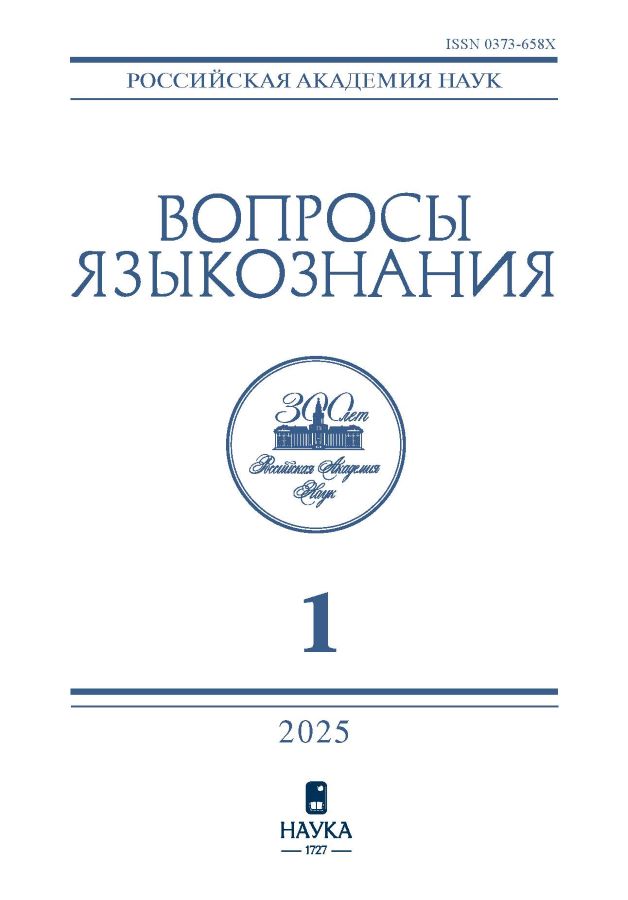Making sense of variable number agreement in Russian
- Авторлар: Ivlieva N.V.1, Podobryaev A.V.1
-
Мекемелер:
- HSE University
- Шығарылым: № 1 (2025)
- Беттер: 62-77
- Бөлім: Articles
- URL: https://freezetech.ru/0373-658X/article/view/682122
- DOI: https://doi.org/10.31857/0373-658X.2025.1.62-77
- ID: 682122
Дәйексөз келтіру
Аннотация
In this paper, we focus on Russian quantified noun phrases that are known to be able to trigger plural verbal agreement or no agreement at all. Descriptively, we offer a novel generalization: when such phrases trigger plural verbal agreement, they cannot be interpreted in the immediate scope of negation. We show that this generalization falls out if these plural-agreeing phrases are treated in semantics as individual-denoting choice-functional indefinites and not as generalized quantifiers. Theoretically, we speculate that interpretable number features are in principle incompatible with generalized quantifier denotations.
Толық мәтін
Авторлар туралы
Natalia Ivlieva
HSE University
Хат алмасуға жауапты Автор.
Email: nivlieva@hse.ru
Ресей, Moscow
Alexander Podobryaev
HSE University
Email: apodobryaev@hse.ru
Ресей, Moscow
Әдебиет тізімі
- Barkova 2023 — Barkova L. Non-isomorphic wide scope of quantified numerals in Russian: Experimental investigation. BA thesis. Moscow: HSE Univ., 2023.
- Büring 1995 — Büring D. The great scope inversion conspiracy. Semantics and Linguistic Theory (SALT) 5. Simons M., Galloway T. (eds.). Ithaca (NY): CLC Publ., 2003, 37–53.
- Büring 2016 — Büring D. (Contrastive) topic. The Oxford handbook of information structure. Féry C., Ishihara S. (eds.). Oxford: Oxford Univ. Press, 2016, 64–85.
- Bylinina, Nowen 2020 — Bylinina L., Nowen R. Numeral semantics. Language and Linguistics Compass, 2020, 14(8): 1–18.
- Farkas, de Swart 2010 — Farkas D., de Swart H. The semantics and pragmatics of plurals. Semantics and Pragmatics, 2010, 3: 1–54.
- Franks 1994 — Franks S. Parametric properties of numeral phrases in Slavic. Natural Language and Linguistic Theory, 1994, 12: 597–674.
- Franks, Pereltsvaig 2004 — Franks S., Pereltsvaig A. Functional categories in the nominal domain. Proc. of Formal Approaches to Slavic Linguistics 12. The Ottawa Meeting 2003. Arnaudova O., Browne W., Rivero M.-L., Stojanović D. (eds.). Ann Arbor (MI): Michigan Slavic Publ., 2004, 109–128.
- Heim 1991 — Heim I. Artikel und Definitheit. Semantik: Ein internationales Handbuch der zeitgenössischen Forschung. von Stechow A., Wunderlich D. (eds.). Berlin: de Gruyter, 1991, 487–535.
- Ivlieva 2013 — Ivlieva N. Scalar implicatures and the grammar of plurality and disjunction. PhD diss. Cambridge (MA): MIT, 2013.
- Kratzer 1998 — Kratzer A. Scope or pseudoscope? Are there wide-scope indefinites? Events and grammar. Rothstein S. (ed.). Dordrecht: Springer, 1998, 163–196.
- Link 1983 — Link G. The logical analysis of plurals and mass terms: A lattice-theoretical approach. Meaning, use and interpretation of language. Bäuerle R., Schwarze C., von Stechow A. (eds.). Berlin: De Gruyter, 1983, 303–323.
- Lyutikova 2010 — Lyutikova E. A. K voprosu o kategorial’nom statuse imennykh grupp v russkom yazyke [Towards the question of categorial status of noun groups in Russian]. Lomonosov Philology Journal, 2010, 6: 36–76.
- Lyutikova 2015 — Lyutikova E. A. Soglasovanie, priznaki i struktura imennoi gruppy v russkom yazyke [Features, agreement, and structure of the Russian noun phrase]. Russkij jazyk v nauchnom osveshchenii, 2015, 30: 44–74.
- Matushansky, Ruys 2015a — Matushansky O., Ruys E. Measure for measure. Slavic Grammar from a Formal Perspective: The 10th Anniversary FDSL Conf., Leipzig 2013. Zybatow G., Biskup P., Guhl M., Hurtig C., Mueller-Reichau O., Yastrebova M. (eds.). Frankfurt am Main: Peter Lang, 2015, 317–330.
- Matushansky, Ruys 2015b — Matushansky O., Ruys E. 4000 measure NPs: Another pass through the шлюз. Proc. of Formal Approaches to Slavic Linguistics 23. The first Berkeley meeting. Szajbel-Keck M., Burns R., Kavitskaya D. (eds.). Ann Arbor (MI): Michigan Slavic Publ., 2015, 184–205.
- Mayr 2015 — Mayr C. Plural definite NPs presuppose multiplicity via embedded exhaustification. Semantics and Linguistic Theory (SALT) 25. D’Antonio S., Moroney M., Little C.-R. (eds.). Ithaca (NY): CLC Publ., 2015, 204–224.
- Padučeva 2004 — Padučeva E. V. Dinamicheskie modeli v semantike leksiki [Dynamic models in lexical semantics]. Moscow: Yazyki slavyanskoi kul’tury, 2004.
- Percus 2006 — Percus O. Antipresuppositions. Theoretical and empirical studies of reference and anaphora: Toward the establishment of generative grammar as an empirical science. Ueyama A. (ed.). Fukuoka: Kyushu Univ., 2006, 52–73.
- Pereltsvaig 2006 — Pereltsvaig A. Small nominals. Natural Language and Linguistic Theory, 2006, 24(2): 433–500.
- Pereltsvaig 2007 — Pereltsvaig A. On the universality of DP: A view from Russian. Studia Linguistica, 2007, 61(1): 59–94.
- Pesetsky 1982 — Pesetsky D. Paths and categories. PhD diss. Cambridge (MA): MIT, 1982.
- Preminger 2014 — Preminger O. Agreement and its failures. Cambridge (MA): MIT Press, 2014.
- Reinhart 1997 — Reinhart T. Quantifier scope: How labor is divided between QR and choice functions. Linguistics and Philosophy, 1997, 20: 335–397.
- Sauerland 2003 — Sauerland U. A new semantics for number. Semantics and Linguistic Theory (SALT) 13. Young R. B., Zhou Y. (eds.). Ithaca (NY): CLC Publ., 2003, 258–275.
- Sauerland 2008 — Sauerland U. On the semantic markedness of phi-features. Phi theory: Phi-features across modules and interfaces. Adger D., Béjar S. (eds.). Oxford: Oxford Univ. Press, 2008, 57–82.
- Sauerland et al. 2005 — Sauerland U., Anderssen J., Yatsushiro K. The plural is semantically unmarked. Linguistic evidence: Empirical, theoretical, and computational perspectives. Kesper S., Reis M. (eds.). Berlin: Mouton de Gruyter, 2005, 413–434.
- Schwarzschild 2002 — Schwarzschild R. Singleton indefinites. Journal of Semantics, 2002, 19: 289–314.
- Szabolcsi 2004 — Szabolcsi A. Positive polarity — Negative polarity. Natural Language and Linguistic Theory, 2004, 22: 409–452.
- von Fintel 1999 — von Fintel K. Quantifier domain selection and pseudo-scope. Talk at the Context Dependence Conf., Cornell Univ., 1999.
- von Fintel, Matthewson 2008 — von Fintel K., Matthewson L. Universals in semantics. The Linguistic Review, 2008, 25: 139–201.
- Winter 1997 — Winter Y. Choice functions and the scopal semantics of indefinites. Linguistics and Philosophy, 1997, 20: 399–467.
- Yanovich 2005 — Yanovich I. Choice-functional series of indefinites and Hamblin semantics. Semantics and Linguistic Theory (SALT) 15. Georgala E., Howell J. (eds.). Ithaca (NY): CLC Publ., 2005, 309–326.
Қосымша файлдар









